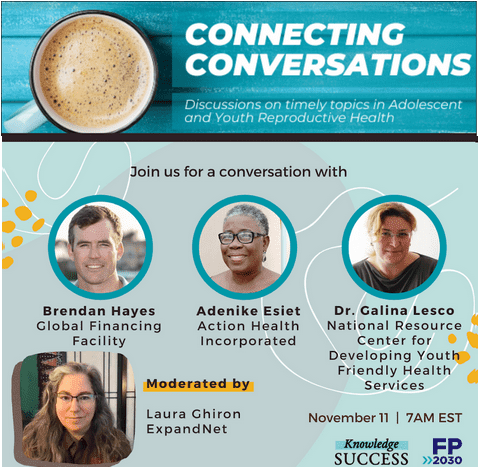“If you design your interventions, with stakeholders, for the system, and with the resources that exist in the system in mind, then you’re more likely to arrive to a scalable and more cost-appropriate model,” ExpandNet Secretariat Member Laura Ghiron said in wapping up the panel discussion on scaling up adolescent and youth sexual and reproductive health programming that was hosted by FP2030 and USAID’s Knowledge SUCCESS Project. She went on to say, “At the same time, we need to accept this is not an overnight process”.
In responding to a question asking what are the necessary components, activities, or requirements for effectively scaling up AYSRH program, Adenike Asiet of Action Health Inc of Nigeria said “A starting out place would be a policy that would guide programming.Then a plan should address the different components: teacher training, access to resource materials for the teachers and learners, mechanisms for classroom delivery, a system for monitoring and evaluation”.
Dr. Galina Lesco of the National Resource Center for Developing Youth-Friendly Health Services in Moldova underscored the importance of demonstrating the effectiveness of an intervention using an evidence-based approach. She also emphasized that “One of the lessons that we learned is to have a sustainable financing mechanism in place for the program before we scale. It is important to have a good economic evaluation of the intervention that we want to scale.”
Brendan Hayes of the World Bank’s Global Financing Facility in Uganda said “I do think that as we are working on adolescent health interventions, thinking about how they would be applied or how they would be delivered through existing government systems is really important. It’s not just about having an intervention that can scale, you need systems surrounding that intervention that can help support and continue quality delivery”.
Discussing the financial constraints associated with the COVID-19 pandemic, Brendan added, “The more we can be aligning our work at country level and be guided by the principles that Adenike and Galina laid out very eloquently, the better. It’s important that those conversations are happening and we’re not spreading ourselves too wide and thin. That doesn’t mean that there’s no room for experimentation, or piloting and trying to push the limits, but I do think that as much as we can, building consensus, and building a critical mass of resources behind some real evidence-based and high-impact interventions… are really important.”
The conversation, which took place on November 11, 2021 was part of a long-running series of conversations on adolescent and youth sexual and reproductive health topics and the recording is viewable in both English and French.


